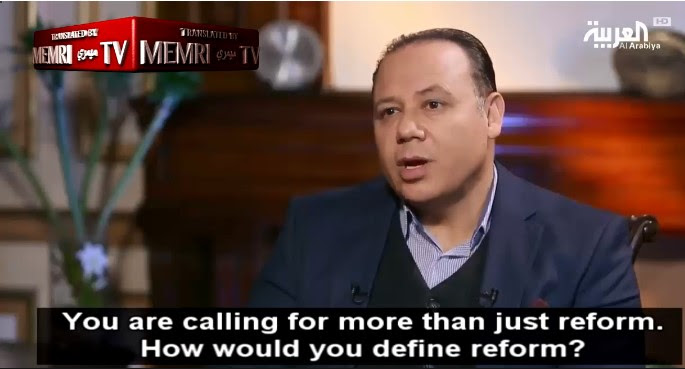By MEMRI –
President of Cairo University Mohamed Al-Khosht called for a “completely new religious discourse,” saying that “reformed discourse” was not enough and calling the notion of reform in Islamic thought “like renovating an old and crumbling building.” All the attempts at reform, from the days of Muhammad Abduh “have yielded disappointing results,” said Al-Khosht, pointing out that “if those reforms had borne fruit, our reality would have changed” and saying that “we should approach the Quran and the Sunna directly, armed with modern sciences.” Al-Khosht was speaking in an Al-Arabiya interview, which aired on February 4.
Click here to view this clip on MEMRI TV
Narrator: “Dr. Al-Khosht calls to move on from the era of religious stagnation, which, he believes, has lasted too long. He opposes the notion of reform in Islamic thought, because, he contends, it is like renovating an old and crumbling building.”

Host: “You are calling for more than just reform. How would you define reform?”

Mohamed Al-Khosht: “All the attempts at reform have yielded disappointing results.”
Host: “Really?”
Mohamed Al-Khosht: “Yes. That’s how it was presented…”
Host: “Since the days of Muhammad Abduh, or even before?”
Mohamed Al-Khosht: “All of them. I judge things according to their results. If those reforms had borne fruit, our reality would have changed. But you can see what our reality is. Therefore, none of the reform attempts were any good.”
Host: “You say ‘attempts.’ What Muhammad Abduh, Tahtawi, and others did were mere attempts?”
Mohamed Al-Khosht: “These were welcome efforts.”
Host: “But they were insufficient?”
Mohamed Al-Khosht: “Those were welcome efforts, but they failed to create a new era. Hujjat Al-Islam Abu Hamed Al-Ghazali talked about the revival of religious sciences. We do not need to revive religious sciences. We need to revive religion itself. We need new sciences. Today, we have modern psychology, sociology, anthropology, political science, economics, and new legal theories. These are all modern sciences. We must give rise to new religious sciences, which will be in keeping with the scientific developments. I’m not talking about religion per se. The old religious sciences were man-made and were the product of their times.

[…]
“This is why we need new sciences, and completely new religious discourse, not just ‘reformed discourse.’
[…]
“We should approach the Quran and the Sunna directly, armed with modern sciences.”

Host: “Who should?”
Mohamed Al-Khosht: “Any Muslim.”
Host: “Forty percent of our people are illiterate and cannot read or write, yet you expect them to cleanse the system of jurisprudence?”

Mohamed Al-Khosht: “There is no need. Sir, faith is a simple thing, whereas the faith presented to us by [the clerics] is complicated. The faith conveyed to us by our Lord is simple.”
_____________________
https://www.memri.org/tv/cairo-university-president-mohamed-khosht-religious-discourse-reform-insufficient-need-to-revive-religion
The President of Cairo University (my alma mater) Professor Dr. Mohamed Al-Khosht’s denunciation of former attempts at reforming Islam through ‘old religious sciences’ is a welcome approach. However, he does not offer clear specifics of the ‘new sciences’ with which to reform Islam in this day and age. It is a welcome step to recognize that Islam needs reform, and that previous attempts were failures but what is missing is the details of his objective. First and foremost is who is entitled to undertake this very important task. Second, how binding would the reforms be? Third, what authority would there be to ‘enforce’ the new tenets of Islam. There are other questions begging for answers. However, the adage that ‘a journey of a thousand miles begins with one step’ is encouraging in this regard. I salute Dr. Al-Khosht for his efforts and wish him the best. Saba E. Demian, M.D.